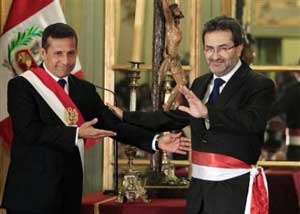24 Jul 2012 - {{hitsCtrl.values.hits}}
 President Ollanta Humala named the justice minister and well-known human rights lawyer, Juan Jimenez, as prime minister on Monday as the Peruvian leader shuffled his Cabinet to try to calm a wave of violent anti-mining protests.
President Ollanta Humala named the justice minister and well-known human rights lawyer, Juan Jimenez, as prime minister on Monday as the Peruvian leader shuffled his Cabinet to try to calm a wave of violent anti-mining protests.
18 Nov 2024 2 hours ago
18 Nov 2024 3 hours ago
18 Nov 2024 3 hours ago
18 Nov 2024 4 hours ago
18 Nov 2024 8 hours ago